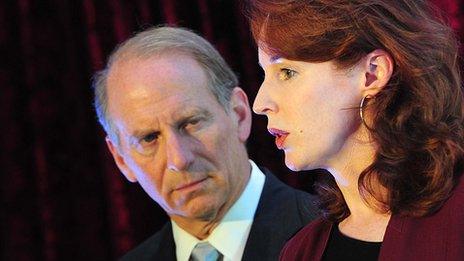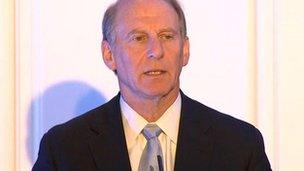Haass talks: Details in the draft document under consideration
- Published

Dr Haass and his colleague, Meghan O'Sullivan, returned to Belfast for a final round of talks on 9 December
It is understood Richard Haass's talks team is suggesting that all councils and other public buildings should fly flags only on 18 designated days as a default option.
However individual councils would have the power to vary the number of days as they wish.
Unionists support flying the union flag all year around, while nationalists tend to favour no flag, a neutral flag, or flying the union flag together with the Irish tricolour.
The BBC understands what is under debate within the talks is how councils could vary the designated days.
An initial suggestion is that, because this is a sensitive matter concerning community relations, such a decision should only be taken by a weighted majority.
However, it is thought most of the parties would prefer to use a simple majority vote.
One unionist source said the document only contained a proposal for councils to decrease the number of days, not to increase them. This would effectively give nationalist controlled councils an "opt out".
Other sources indicated that if the final proposal allowed for councils to increase the number of days,
This could lead to unionist majority councils continuing to fly the union flag all year around, while councils with nationalist majorities would have no flag.
Belfast, as a balanced council, would in all likelihood continue to fly the flag on designated days alone.
The Alliance party is arguing that the designated days option should apply to all councils and all government departments.
On parades and protests, the parties are considering what is referred to as a three-tier approach.
Organisers will be able to notify events through their local councils.

Richard Haass said he still believes a consensus can be reached by the political parties by the end of 2013
A public events facilitation body will deal with dialogue and mediation about events.
A public events authority will adjudicate on contentious parades or protests. It will have seven members. There will be some kind of appeal mechanism although this body will be much smaller and appeals will be limited to technical issues.
In the deal agreed between the DUP and Sinn Féin in 2010 it was proposed that the responsibility for parading should go to the Office of the First Minister and Deputy First Minister.
In the Haass process it is suggested the parading institutions should be independent, but the overarching responsibility would be with the Department of Justice.
Some unionists say while they don't see a problem with this arrangement given that the current incumbent is an Alliance minister, they worry about what might happen should the justice department change hands in the future.
On the past, it is understood there will be a single investigative body bringing together work currently carried out by the Historical Enquiries Team (HET) and Police Ombudsman and possibly the coroners courts.
There is also a proposal for an independent information recovery body that would have the power to offer limited immunity covering information brought to it.
People providing information could not have their own testimony used against them in court, but they could be open to prosecution on the basis of evidence from elsewhere.
There are references to the creation of a Troubles museum in the document being considered by the parties, but there is no specific reference to the Maze Peace Centre put on hold by First Minister Peter Robinson.